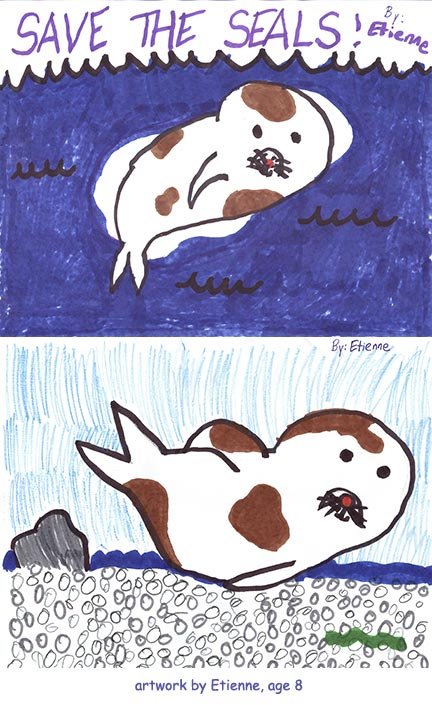Resources
Partners & Guides
Seal Sitters’ guide of community partners and contacts, educational resources for kids, and other resources to learn about marine mammals.

Our Network Contacts
Seal Sitters is part of NOAA's West Coast Marine Mammal Stranding Network. If you encounter a marine mammal, please contact the organization based on your location:
Regional Contacts
West Seattle
Brace Point through Duwamish River, including Harbor Island
Seal Sitters Hotline: 206-905-SEAL (7325)Sno-King Marine Mammal Response
King and Snohomish counties
206-695-2277
MaST Center Aquarium
Des Moines, WA
866-767-6114Washington/Oregon Beaches
NOAA West Coast Stranding Hotline:
1-866-767-6114View map of WA
stranding networks (PDF) →
Emergency Contacts
All marine mammals are protected by federal laws. It's illegal to touch, feed, move, harass, or approach — stay 100 yards away.
Report Harassment or Danger
NOAA Law Enforcement:
1-800-853-1964
Entangled Marine Mammals
1-877-767-9425
(1-877-SOS-WHALE)
or hail U.S. Coast Guard on VHF ch 16Sea Otter Strandings
Washington Sea Otter Stranding Hotline:
1-877-326-8837
(1-877-SEAOTTER)
PAWS (for non-marine wildlife)
Lynnwood, WA
Online self-service or 425-412-4040
Partner Organizations
Seal Sitters and SR3 work together to rescue a seal pup on Alki Beach
Photo credit: Jeffrey Kurtz
Our work wouldn't be possible without our partnerships with these important organizations:
SR3 (SeaLife Response, Rehab, and Research)
SR3 has a marine mammal hospital providing health assessments, rehabilitation, and scientific research. SR3 personnel also assist us on the beach to make on-site assessments, and to retrieve animals that need care in their rehabilitation center (see image).Seattle Parks and Recreation provides access and support for our beach protection efforts. Since most of our work takes place on public beaches, their help is invaluable in facilitating our efforts.
NOAA Fisheries provides federal oversight and scientific guidance.
Washington Department of Fish and Wildlife assists with wildlife management and protection.
Port of Seattle supports our work in industrial waterways and harbor areas.
Other community links
Kids Corner
Helping children understand and appreciate marine mammals is an important part of our mission. Resources for young nature enthusiasts include:
Educational Coloring Pages:
In the Ocean (PDF)
On the Beach (PDF)
For Young Readers:
Leopard and Silkie: One Boy's Quest to Save the Seals by Seal Sitters co-founders Brenda Peterson and Robin Lindsey is based on the true story of two seal pups who shared the shore in West Seattle and the Seal Sitters who protected them.
This picture book gives a first-hand look at what baby seals are up against in the wild. With an emphasis on compassion, this true story teaches children to appreciate the natural world by helping any way they can.
Respectful Viewing Tips
Spotted a seal on the beach? You're witnessing something special! Here's how to make sure these animals remain safe while you enjoy this unique wildlife experience.
👀 Keep your distance:
Stay 100 yards away if possible
If the animal looks at you, you're too close!☎️ Call our hotline: 206-905-SEAL (7325)
🐕 Keep dogs away:
Dogs are not allowed on Seattle beaches (city ordinance)🔭 Watch from a distance:
Use binoculars or a zoom camera lens for a closer look without disturbing the animal🛶 Control watercraft:
Keep boats, paddleboards, and kayaks well away🤫 Stay quiet and calm:
Sudden movements and loud noises can cause stress🗣️ Spread the word!
Let others know to keep their distance
Photo credit: Robin Lindsey
Common Questions
-
No, please don't approach marine mammals for photos. Federal law requires staying at least 100 yards away.
Even approaching for a quick photo can stress the animal and potentially cause them to abandon their resting spot or, in the case of mothers, their pups. Instead, use a zoom lens or binoculars to observe and photograph these amazing animals from a safe distance.
-
While seals and sea lions aren't typically aggressive toward humans, it's still best to keep your distance both on land and in water. These are wild animals that can become stressed or defensive if they feel threatened.
Always maintain at least 100 yards distance, and if you're on a paddleboard or kayak, change your course to give them plenty of space.
-
If you witness someone harassing or disturbing marine mammals, please call the NOAA Fisheries Enforcement Hotline at 1-800-853-1964. If the situation is urgent, you may also contact local law enforcement.
Please do not confront the individual yourself. If possible, document the incident with photos or video from a safe distance without further disturbing the animal.
Photo credit: David Hutchinson
Boater Guidelines
Boaters need to be careful not to disrupt marine mammals. Stay back from areas where seals and sea lions are resting, including buoys, and give swimming marine mammals space.
Keep boats, paddleboards, and kayaks well away from animals.
⚠️ Remember: Keep your distance!
All marine mammals are protected by federal laws. It's illegal to touch, feed, move or harass. Stay at least 100 yards away if possible.
If you see someone harassing or harming a marine mammal, or allowing their pets to, call the NOAA Fisheries Enforcement Hotline at 1-800-853-1964.
Photo credit: Robin Lindsey
the BlubberBlog
Explore Seal Sitter’s archive of “pupdates”, beach rescues and community engagement over many years of marine mammal protection work.








